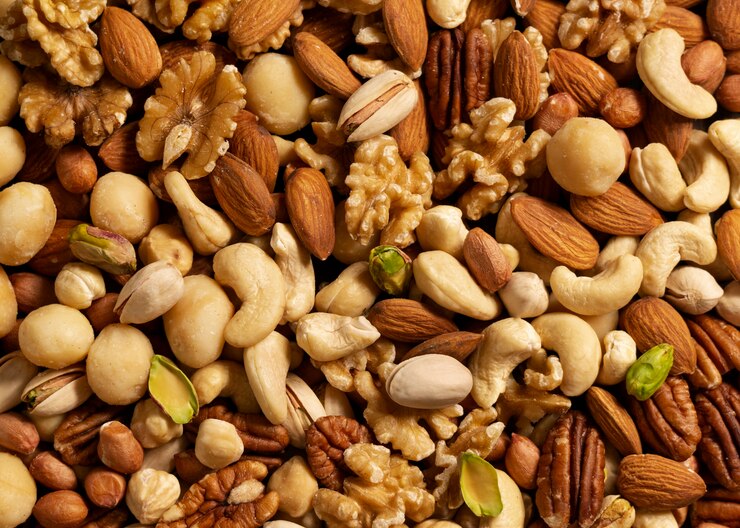
Nuts are often dismissed as just another junk food snack, but the truth is they’re packed with incredible health benefits. These bite-sized treats loaded with antioxidants, protein, vitamins, unsaturated fats, fiber, and essential minerals. Nuts are particularly rich in monounsaturated and polyunsaturated fats, which are linked to better heart health. Adding nuts and seeds in moderation to your daily diet can do wonders for keeping your heart healthy.
What Is Heart Disease?
Heart disease is the leading cause of death in the United States, responsible for one in every four deaths. This condition occurs when blood flow to the heart, brain, or the rest of the body is reduced due to blockages or narrowing of the arteries. These blockages often result from cholesterol buildup in the artery walls, damaging coronary arteries and limiting blood circulation. Conditions like myocardial infarction, arrhythmia, and coronary heart disease are common forms of heart disease.
Why Are Nuts Good for Your Heart?
Nuts are considered a “super-snack” because they’re full of unsaturated fatty acids and other heart-healthy nutrients. They lower LDL (“bad”) cholesterol, reduce the risk of blood clots that can lead to heart attacks, and improve the health of arterial linings. Nuts also contain beneficial fats that help control appetite, manage cholesterol levels, and support overall heart health. Regular consumption of nuts can even help prevent heart disease and diabetes.
What Makes Nuts Heart-Healthy?
Nuts aren’t just delicious—they’re packed with specific nutrients that make them a great choice for heart health:
– Unsaturated Fats: Nuts are high in monounsaturated and polyunsaturated fats. These healthy fats help lower LDL cholesterol and raise HDL (“good”) cholesterol, reducing the risk of coronary heart disease. They’re also a better snacking option than foods high in saturated fats like baked goods or fatty meats.
– Omega-3 Fatty Acids: These fats, found in many nuts, can reduce the risk of heart attacks and strokes. Omega-3s help prevent abnormal heart rhythms and provide extensive benefits for heart health and blood sugar control.
– Fiber: Nuts are an excellent source of fiber, which helps lower cholesterol, supports digestive health, and eliminates harmful toxins from the body.
– Vitamins: Many nuts are rich in vitamins, particularly vitamin E, which can prevent plaque buildup in arteries, reducing the risk of heart attacks and coronary artery disease.
– Plant Sterols: These naturally occurring compounds help lower cholesterol levels and are present in nuts alongside many fruits, vegetables, and cereals.
– L-arginine: Nuts contain this amino acid, which helps improve artery health by making them more flexible and reducing blood clot risks.
The Impact of Specific Nuts on Cardiovascular Health
Different nuts offer unique benefits to heart health, so adding a variety to your diet is key:
– Almonds: Eating two servings of almonds can lower LDL cholesterol, reducing plaque buildup in arteries. Almonds can also improve insulin sensitivity, making them beneficial for people with or at risk of diabetes.
– Walnuts: These nuts are rich in polyunsaturated fats and alpha-linolenic acid, an anti-inflammatory agent. Eating walnuts twice a week can significantly lower the risk of cardiovascular disease.
– Peanuts: A popular option for protein, peanuts and peanut butter can lower cholesterol levels and reduce diabetes risk when included in a balanced diet.
– Pistachios: Known for their antioxidants and heart-friendly plant sterols, pistachios can lower LDL cholesterol and reduce diabetes-related artery issues.
– Cashews and Pecans: These tree nuts provide healthy nutrients and antioxidants that may lower cholesterol levels and reduce inflammation.
– Macadamias and Hazelnuts: Due to their high monounsaturated fat content, these nuts can lower total and LDL cholesterol. Hazelnuts are also rich in vitamin E, which may help reduce heart disease risk factors.
General Advice for Including Nuts in Your Diet
To maximize the health benefits, opt for raw, unprocessed, or unpeeled nuts whenever possible. Raw nuts are the most natural form, acting as little health capsules that support heart health and promote healthy aging. Avoid nuts that are salted, flavored, or have added preservatives, as these can counteract their natural benefits. Incorporating a variety of raw nuts into your eating plan is one of the simplest ways to protect your heart and improve overall health.